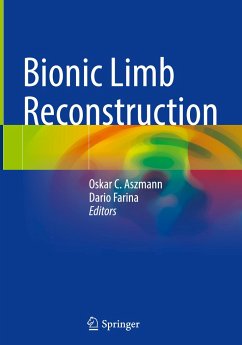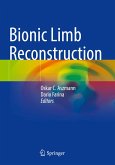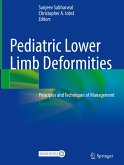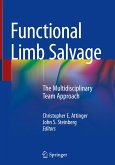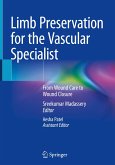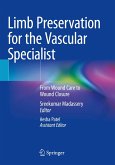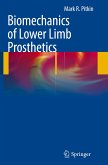Bionic Limb Reconstruction
Herausgegeben:Aszmann, Oskar C.; Farina, Dario
Bionic Limb Reconstruction
Herausgegeben:Aszmann, Oskar C.; Farina, Dario
- Gebundenes Buch
- Merkliste
- Auf die Merkliste
- Bewerten Bewerten
- Teilen
- Produkt teilen
- Produkterinnerung
- Produkterinnerung
This book presents the latest techniques in amputation rehabilitation and summarizes the most recent research findings in the field of bionic limb reconstruction. Divided into seven parts written by experts in the field, it provides valuable information on e.g. upper extremity injuries, psychological considerations, prosthetic engineering, and surgical and rehabilitation strategies. Illustrative figures and photos of real-life settings further assist understanding. This book is of interest not only for plastic surgeons, but also for hand surgeons, orthopedic and trauma surgeons as well as therapists, prosthetists and engineers. …mehr
Andere Kunden interessierten sich auch für
![Bionic Limb Reconstruction Bionic Limb Reconstruction]() Bionic Limb Reconstruction87,99 €
Bionic Limb Reconstruction87,99 €![Pediatric Lower Limb Deformities Pediatric Lower Limb Deformities]() Pediatric Lower Limb Deformities198,99 €
Pediatric Lower Limb Deformities198,99 €![Functional Limb Salvage Functional Limb Salvage]() Functional Limb Salvage110,99 €
Functional Limb Salvage110,99 €![Functional Limb Salvage Functional Limb Salvage]() Functional Limb Salvage157,99 €
Functional Limb Salvage157,99 €![Limb Preservation for the Vascular Specialist Limb Preservation for the Vascular Specialist]() Limb Preservation for the Vascular Specialist110,99 €
Limb Preservation for the Vascular Specialist110,99 €![Limb Preservation for the Vascular Specialist Limb Preservation for the Vascular Specialist]() Limb Preservation for the Vascular Specialist80,99 €
Limb Preservation for the Vascular Specialist80,99 €![Biomechanics of Lower Limb Prosthetics Biomechanics of Lower Limb Prosthetics]() Mark R. PitkinBiomechanics of Lower Limb Prosthetics131,99 €
Mark R. PitkinBiomechanics of Lower Limb Prosthetics131,99 €-
-
-
This book presents the latest techniques in amputation rehabilitation and summarizes the most recent research findings in the field of bionic limb reconstruction. Divided into seven parts written by experts in the field, it provides valuable information on e.g. upper extremity injuries, psychological considerations, prosthetic engineering, and surgical and rehabilitation strategies. Illustrative figures and photos of real-life settings further assist understanding. This book is of interest not only for plastic surgeons, but also for hand surgeons, orthopedic and trauma surgeons as well as therapists, prosthetists and engineers.
Hinweis: Dieser Artikel kann nur an eine deutsche Lieferadresse ausgeliefert werden.
Hinweis: Dieser Artikel kann nur an eine deutsche Lieferadresse ausgeliefert werden.
Produktdetails
- Produktdetails
- Verlag: Springer / Springer International Publishing / Springer, Berlin
- Artikelnr. des Verlages: 978-3-030-60745-6
- 1st edition 2021
- Seitenzahl: 248
- Erscheinungstermin: 5. Januar 2021
- Englisch
- Abmessung: 260mm x 183mm x 19mm
- Gewicht: 727g
- ISBN-13: 9783030607456
- ISBN-10: 3030607453
- Artikelnr.: 60066397
- Herstellerkennzeichnung Die Herstellerinformationen sind derzeit nicht verfügbar.
- Verlag: Springer / Springer International Publishing / Springer, Berlin
- Artikelnr. des Verlages: 978-3-030-60745-6
- 1st edition 2021
- Seitenzahl: 248
- Erscheinungstermin: 5. Januar 2021
- Englisch
- Abmessung: 260mm x 183mm x 19mm
- Gewicht: 727g
- ISBN-13: 9783030607456
- ISBN-10: 3030607453
- Artikelnr.: 60066397
- Herstellerkennzeichnung Die Herstellerinformationen sind derzeit nicht verfügbar.
Oskar C. Aszmann studied medicine at the University of Vienna, Austria, and received his medical degree in 1994. From 1994 to 1997, he was research fellow at the Department of Orthopedic Surgery, John Hopkins Hospital, Baltimore, USA. Until 1997, he was also staff scientist at the Department of Anatomy and Cell Biology, University of Maryland, USA. He was born in Vienna, Austria, and after working at the University Hospital Vienna for six years, he specialized as a plastic surgeon in 2004. In 2012 Professor Aszmann established a Center for Extremity Reconstruction and Rehabilitation to explore the possibilities and limits of bionic reconstruction, and has since been head of this center, which focuses on recovery and rehabilitation patients with impaired extremity function. Dario Farina received Ph.D. degrees in automatic control and computer science and in electronics and communications engineering from the Ecole Centrale de Nantes and Politecnico di Torino, respectively, and an Honorary Doctorate degree in Medicine from Aalborg University. He is currently Full Professor and Chair in Neurorehabilitation Engineering at the Department of Bioengineering of Imperial College London. He has previously been Full Professor at Aalborg University and at the University Medical Center Göttingen, Georg-August University, where he founded and directed the Department of Neurorehabilitation Systems, acting as the Chair in Neuroinformatics of the Bernstein Focus Neurotechnology Göttingen. His research focuses on neurorehabilitation technology, neural control of movement, and biomedical signal processing.
Introduction.- Part I. Severe injuries of the upper extremity.- Chapter 1. General Considerations on Upper Limb Amputation and its Levels.- Chapter 2. Psychosocial importance of the hand, consequences of severe hand trauma, amputation and complete brachial plexus injury.- Chapter 3. Inner amputations of the upper extremity.- Part II. Functional restoration in upper limb amputees.- Chapter 4. Body-powered prosthetic systems.- Chapter 5. Mechatronic Design of Functional Prosthetic Systems.- Chapter 6. Osseointegrated amputation prostheses and implanted electrodes.- Chapter 7. Outcome Measures.- Chapter 8. Biologic alternatives to prosthetic hand replacement.- Part III. Selective nerve transfers in upper limb amputees.- Chapter 9. Motor unit characteristics after selective nerve transfers.- Chapter 10. Targeted muscle reinnervation in upper limb amputees.- Part IV. Phantom pain in limb amputees.- Chapter 11. Epidemiology and mechanisms of phantom limb pain.- Chapter 12. Treatment strategies for phantom limb pain.- Part V. Man-machine interfaces in prosthetics.- Chapter 13. Control Strategies for Functional Upper Limb Prostheses.- Chapter 14. Implantable myoelectric sensors for prosthetic control.- Chapter 15. Prosthetic feedback systems.- Part VI. Prosthetic replacement in patients with inner amputations.- Chapter 16. Deafferentation pain following brachial plexus avulsion injuries.- Chapter 17. Treatment algorithm for bionic hand reconstruction in patients with global brachial plexopathies.- Chapter 18. Functional and psychosocial outcomes of bionic reconstruction and impact on quality of life, body image perception and deafferentation pain.- Chapter 19. Ethical considerations and psychological evaluation in elective amputation for Brachial Plexus Injuries.- Part VII. Rehabilitation in upper limb prosthetics.- Chapter 20. Principles of Occupational and Physical Therapy in Upper Limb Amputations.- Chapter 21. Novel technologies in upper extremity rehabilitation.-Chapter 22. Conclusions and Future Outlook.
Introduction.- Part I. Severe injuries of the upper extremity.- Chapter 1. General Considerations on Upper Limb Amputation and its Levels.- Chapter 2. Psychosocial importance of the hand, consequences of severe hand trauma, amputation and complete brachial plexus injury.- Chapter 3. Inner amputations of the upper extremity.- Part II. Functional restoration in upper limb amputees.- Chapter 4. Body-powered prosthetic systems.- Chapter 5. Mechatronic Design of Functional Prosthetic Systems.- Chapter 6. Osseointegrated amputation prostheses and implanted electrodes.- Chapter 7. Outcome Measures.- Chapter 8. Biologic alternatives to prosthetic hand replacement.- Part III. Selective nerve transfers in upper limb amputees.- Chapter 9. Motor unit characteristics after selective nerve transfers.- Chapter 10. Targeted muscle reinnervation in upper limb amputees.- Part IV. Phantom pain in limb amputees.- Chapter 11. Epidemiology and mechanisms of phantom limb pain.- Chapter 12. Treatment strategies for phantom limb pain.- Part V. Man-machine interfaces in prosthetics.- Chapter 13. Control Strategies for Functional Upper Limb Prostheses.- Chapter 14. Implantable myoelectric sensors for prosthetic control.- Chapter 15. Prosthetic feedback systems.- Part VI. Prosthetic replacement in patients with inner amputations.- Chapter 16. Deafferentation pain following brachial plexus avulsion injuries.- Chapter 17. Treatment algorithm for bionic hand reconstruction in patients with global brachial plexopathies.- Chapter 18. Functional and psychosocial outcomes of bionic reconstruction and impact on quality of life, body image perception and deafferentation pain.- Chapter 19. Ethical considerations and psychological evaluation in elective amputation for Brachial Plexus Injuries.- Part VII. Rehabilitation in upper limb prosthetics.- Chapter 20. Principles of Occupational and Physical Therapy in Upper Limb Amputations.- Chapter 21. Novel technologies in upper extremity rehabilitation.-Chapter 22. Conclusions and Future Outlook.

